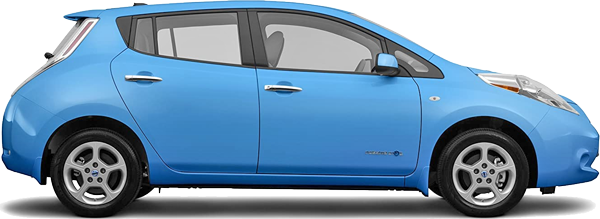The Comparative Analysis :
Nissan Leaf 30 kWh (15 - 17) vs. Hyundai i30 1.6 CRDi (18 - 19)
€ 31,300

€ 21,800

€ 31,300
Base Price ⓘBase price of a new vehicle with standard equipment in Germany at market launch.
€ 21,800
ⓘBase price of a new vehicle with standard equipment in Germany at market launch. Price Info
Vehicle Dimensions
The dimensions of these vehicles differ considerably. The Nissan Leaf (30 kWh) is 4.1 inches longer, an inch narrower and 3.7 inches taller than the Hyundai i30 1.6 CRDi.
Nissan Leaf (30 kWh)
Hyundai i30 1.6 CRDi
61
69.7
77.6
57.3
70.7
80.7
69.7 in
Width
70.7 in
77.6 in
Width Incl. Mirrors
80.7 in
61 in
Height
57.3 in
106.3
175
104.3
170.9
175 in
Length
170.9 in
106.3 in
Wheelbase
104.3 in
Vehicle Weight
Nissan Leaf (30 kWh)
Hyundai i30 1.6 CRDi
3538 lb
Curb Weight
2950 lb
4343 lb
Gross Vehicle
Weight
Weight
4101 lb

Weight Difference:
589 lb
16.65 %

General
Nissan Leaf (30 kWh)
Hyundai i30 1.6 CRDi
ZE0
Generation
PDE
Hatchback
Car Body Style
Hatchback
Electricity
Fuel Type
Diesel

Front-wheel drive
Drivetrain
Front-wheel drive

1-speed automatic transmission
Transmission
6-speed manual transmission
Engine
Nissan Leaf (30 kWh)
Hyundai i30 1.6 CRDi
Electrically excited synchronous motor
Engine Type
Straight-four diesel engine with turbocharger
0
Valves
4
0
Cylinders
4
0 L / 0 cu in
Displacement
1.6 L / 78 cu in
108 hp
at 0 rpm
Power
94 hp
at 4000 rpm
Nissan Leaf (30 kWh)
108 hp
94 hp
Hyundai i30 1.6 CRDi
187 lb‑ft
at 0 rpm
Max. Torque
207 lb‑ft
at 1500 rpm
Nissan Leaf (30 kWh)
187 lb‑ft
207 lb‑ft
Hyundai i30 1.6 CRDi
Performance
Nissan Leaf (30 kWh)
Hyundai i30 1.6 CRDi
89 mph
Maximum Speed
116 mph
11.5 sec
Acceleration 0 to 62 mph
12.2 sec
62 mph
62
mph
mph
525 ft
0.000 sec

Nissan Leaf (30 kWh)
62 mph
62
mph
mph
554 ft
0.000 sec

Hyundai i30 1.6 CRDi
▶ REPLAY
32.76 lb/hp
Weight-to-Power Ratio
31.38 lb/hp
Nissan Leaf (30 kWh)
32.76 lb/hp
31.38 lb/hp
Hyundai i30 1.6 CRDi
Fuel Economy / Emissions
Nissan Leaf (30 kWh)
Hyundai i30 1.6 CRDi
Fuel Economy
24 kWh✽
( 138 MPGe ⓘ Miles per gallon gasoline equivalent (MPGe) is a measure of the average distance traveled per unit of energy consumed. MPGe, specified in miles per U.S. gallon, is used to compare the energy consumption of vehicles that use different energy sources.)
combined ✽ per 100 miles
60 mpg
( 68 MPGe ⓘ Miles per gallon gasoline equivalent (MPGe) is a measure of the average distance traveled per unit of energy consumed. MPGe, specified in miles per U.S. gallon, is used to compare the energy consumption of vehicles that use different energy sources.)
Nissan Leaf (30 kWh)
138 MPGe
68 MPGe
Hyundai i30 1.6 CRDi
No data
city
53 mpg
No data
highway
64 mpg
30 kWh
Fuel Tank Capacity
13.2 gal
124 mi
Range
797 mi
Nissan Leaf (30 kWh)
124 mi
797 mi
Hyundai i30 1.6 CRDi
Environmental Impact
48.8 kWh
Total Energy Consumption
per 100 miles ⓘThe total energy consumption per 100 miles is the amount of energy consumed by a vehicle when burning fuel or using electricity per 100 miles (final energy), and the energy required to produce the appropriate amount of fuel or electricity (primary energy).
per 100 miles ⓘThe total energy consumption per 100 miles is the amount of energy consumed by a vehicle when burning fuel or using electricity per 100 miles (final energy), and the energy required to produce the appropriate amount of fuel or electricity (primary energy).
80.3 kWh
Nissan Leaf (30 kWh)
48.8 kWh
80.3 kWh
Hyundai i30 1.6 CRDi
Elektrofahrzeug
Emission Standard
Euro 6d-TEMP
0 g/mi (NEFZ)
CO2 Emissions
214 g/mi (WLTP)
Practical Convenience
Nissan Leaf (30 kWh)
Hyundai i30 1.6 CRDi
5
Doors
5
5
No. of Seats
5
805 lb
Maximum Payload
1151 lb
10.5 cu ft
Trunk Volume
11.2 cu ft









20.4 cu ft
Cargo Volume (Seats Down)
36.8 cu ft


















